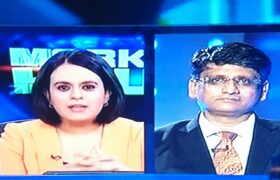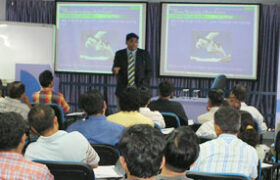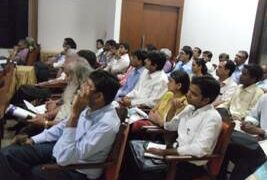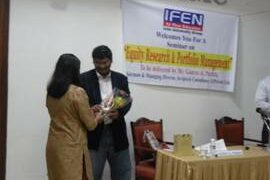There are no current notifications of our companies on this date.
https://www.bseindia.com/markets/MarketInfo/DispNewNoticesCirculars.aspx?page=20190612-43
1. Scrip code : 531223
Name : Anjani Synthetics Limited
Subject : Announcement under Regulation 30 (LODR)-Acquisition
With Reference to above mentioned subject, please note that ANITA VASUDEV AGARWAL has purchased 19,110 equity shares on 12.06.2019 of Anjani Synthetics Limited, a Company registered under the Companies act, 1956, having its registered office at 221 (Maliya) New Cloth Market, Ahmedabad-380002. Please find enclosed herewith Annexure the Disclosure as per Regulation 29(2) of SEBI (Substantial Acquisition of Shares and Takeovers) Regulations, 2011 We request you to take the above information on your records. Kindly acknowledge the receipt.
2. Scrip code : 514474
Name : Fair Deal Filaments Ltd.
Subject : Board Meeting Intimation for Allotment Of Shares Pursuant To Scheme Of Merger By Absorption Of Fairdeal Filaments Limited By Shahlon Silk Industries Limited.
FAIR DEAL FILAMENTS LTD.-$has informed BSE that the meeting of the Board of Directors of the Company is scheduled on 17/06/2019 ,inter alia, to consider and approve 1. To issue and allot 1 Equity Share of Shahlon Silk Industries Limited (SSIL) to the Shareholders of Fairdeal Filaments Limited (FFL) for every 0.90 Equity Share held, whose name appears on the Register of Members of Fairdeal Filaments Limited on the Record Date i.e. 14th June, 2019 pursuant to Scheme of Merger by Absorption of Fairdeal Filaments Limited by Shahlon Silk Industries Limited vide NCLT Order dated 10th May, 2019. Further, the total no. of new shares to be issued and allotted by SSIL to the Equity Shareholders of FFL may vary from the total number of shares on account of fractional entitlement as mentioned above and as per clause 8.8, 8.9 and 8.10 of the Scheme of Merger. 2. Any other Matter with the permission of the chair.
3. Scrip code : 532636
Name : IIFL FINANCE LIMITED
Subject : Composite Scheme Of Arrangement – Demerger Of IIFL Securities Limited (‘ISL’) And IIFL Wealth Management Limited (‘IWML’)
This is in reference to our earlier intimation dated May 15, 2019 about the Record Date in relation to the above. In this regard, we would like to inform that as per the Scheme ISL has allotted 1 (One) fully paid up Equity Share of Rs. 2/- each of ISL for every 1 (one) fully paid up Equity Shares of Rs. 2/- each held by shareholders of IIFL Finance Limited (‘IIFL Finance’) (Erstwhile IIFL Holdings Limited) and IWML has allotted 1(one) fully paid up Equity Shares of Rs. 2/- each of IWML for every 7 (Seven) fully paid up Equity Shares of Rs. 2/- each held by the shareholders of IIFL Finance on June 06, 2019. The credit of the said shares has been completed into the Demat Account of the shareholders. For the shareholders holding physical share certificates, the share certificates of ISL and IWML will be dispatched in due course. We request you to take this on record and oblige.
4. Scrip code : 533181
Name : Intrasoft Technologies Limited
Subject : Announcement under Regulation 30 (LODR)-Updates on Acquisition
Purchase of Shares by Promoter
5. Scrip code : 538564
Name : James Warren Tea Limited
Subject : Updates on Buyback Offer (Letter of Offer)
VC Corporate Advisors Private Limited (“Manager to Buyback Offer”) has submitted to BSE a copy of Letter of Offer for the attention of the Equity Shareholders / Beneficial Owners of Equity Shares of James Warren Tea Ltd (“Target Company”).
6. Scrip code : 530075
Name : Selan Exploration Technology Ltd.
Subject : Announcement under Regulation 30 (LODR)-Daily Buy Back of equity shares Daily Buyback Reporting
7. Scrip code : 535602
Name : Sharda Motor Industries Ltd
Subject : Announcement under Regulation 30 (LODR)-Updates on Joint Venture
In furtherance to our Letter No. SMIL: BSE/NSE: 19-20/1604, dated 16th April, 2019, whereby we have intimated that in pursuance of Joint Venture (JV) Agreement the Company has purchased its 50% share (5,000 shares of Rs. 10 each) in the proposed JV Company i.e. Exhaust Technology Private Limited (ETPL) and an equal stake shall be brought by the Eberspaecher Exhaust Technology International GmbH (JV Partner or EET) in due course of time, the Company do hereby submit that JV Partner acquired / bought its 50% share (5,000 shares of Rs. 10 each) in ETPL, accordingly the ETPL becomes the JV Company of EET and Sharda Motor Industries Limited. This is for your information and records.











